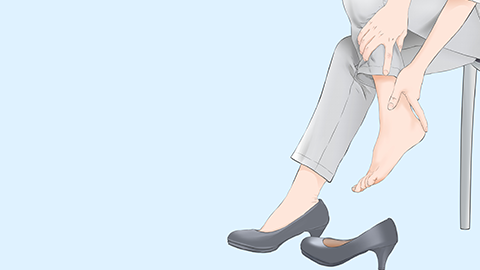What causes headaches and sore feet?
Generally, headaches and foot pain may be caused by overexertion, emotional fluctuations, iron deficiency anemia, cervical spondylosis, hypertension, and other factors. Symptomatic treatment such as general care or medication may be needed. If discomfort persists, it is recommended to seek timely medical advice and undergo appropriate treatment under a doctor's guidance. Detailed analysis is as follows:

1. Overexertion
Frequent engagement in strenuous physical labor or maintaining the same posture for prolonged periods without sufficient rest may lead to muscle and joint strain, causing foot pain and headaches. This may be accompanied by body aches, fatigue, and other discomforts. It is recommended to ensure adequate rest and relieve pain and discomfort through massage.
2. Emotional Fluctuations
Significant emotional changes, such as long-term anxiety, depression, or irritability, may affect the nervous and endocrine systems, causing physiological changes such as muscle tension and blood vessel constriction, which can lead to pain and discomfort. Symptoms may also include irritability and insomnia. It is recommended to maintain a positive mindset and emotional stability, and relieve stress and anxiety through activities such as exercise, meditation, and listening to music.
3. Iron Deficiency Anemia
Long-term picky eating habits may lead to iron deficiency anemia. This condition reduces the number of red blood cells and hemoglobin levels, affecting oxygen transport. Insufficient oxygen supply may cause hypoxia in tissues of the brain and legs, leading to headaches and foot pain. Symptoms may also include pale complexion, fatigue, and rapid heartbeat. It is recommended to follow medical advice to use medications such as compound ferrous sulfate granules, ferrous gluconate tablets, and iron sucrose injections for treatment.
4. Cervical Spondylosis
Long-term cervical strain or degeneration may cause cervical spondylosis, which can compress cervical nerve roots, affecting sensory nerves in the neck and head, leading to headaches. Cervical spondylosis may also affect nerves in the waist and legs, causing foot pain. Symptoms may also include neck stiffness, shoulder and back pain, and finger numbness. It is recommended to follow medical advice to use medications such as chlorzoxazone tablets, eperisone hydrochloride tablets, and naproxen sodium tablets to relieve symptoms.
5. Hypertension
Long-term high-salt diet, emotional fluctuations, genetic factors, and other reasons may lead to hypertension. Hypertension refers to persistently elevated blood pressure, causing blood vessel constriction and hardening. Vasoconstriction may lead to poor circulation in the head and feet, causing headaches and foot pain. Symptoms may also include palpitations, shortness of breath, and chest tightness. It is recommended to follow medical advice to use medications such as nifedipine tablets, methyldopa tablets, and captopril sustained-release tablets for treatment.
It is recommended to maintain a balanced diet, consume adequate protein and vitamin-rich foods such as eggs and oranges, and drink plenty of warm water to help maintain overall health.




